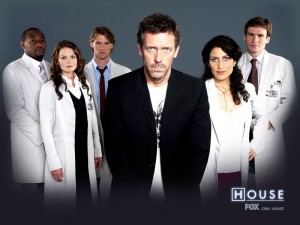People love to watch the heightened drama of the emergency room and hospital from the comfort of their own couch. They do not have to deal with the emotional stress nor feel faint from the physical sight of blood. All they see are attractive, smart doctors treating patients with ease. But this glamorized medical world is far from reality. Seldom to people recognize the moral dilemmas of medical treatment and professionalism depicted in popular medical television shows like House, M.D. and Grey’s Anatomy.
Faculty from the John Hopkins’ Berman Institute of Bioethics analyzed depictions of bioethical issues and professionalism over a full season of Grey’s Anatomy and House, M.D. and found that “the shows were “rife” with ethical dilemmas and actions that often ran afoul of professional codes of conduct” (Nauert). Informed consent was the most frequently witnessed bioethical issue. In the total of 49 cases, 43 percent were cited as “exemplary” consent, meaning that the depictions portrayed a balanced discussion with the patient about possible treatment options, and the remaining cases were classified as “inadequate” (Nauert). Inadequate depictions involved hurried, one-sided discussions and refusal of physicians to answer patient’s questions, sometimes even complete disregard for the informed consent doctrine (Nauert).
Occasionally, dismissal of informed consent seems justified by positive outcomes, as seen in the following clip from Grey’s Anatomy, when an autopsy is conducted on a deceased patient without the family’s consent: https://www.youtube.com/watch?v=0hgNQni0xdw. However, this is how the screenwriters wanted the situation to play out. In the real world, serious repercussions would obviously accompany the doctors’ rash decision.
While television’s impact on us is limited, it still has an influence on our expectations and beliefs about the world around us. It has shaped our perceptions of many careers like law enforcement and forensic science; medicine is no different. A previous study conducted by one of the co-authors of the article, found that more than 80 percent of medical and nursing students watch medical dramas on television (Nauert). What exactly are aspiring doctors learning from these shows? How do various depictions of ethical issues shape their moral perception of every day patient encounters?
As previously mentioned in other blog posts, physicians do not think informed consent is an “integral part of good patient care” (Lidz et al, 303). Perhaps the popular medical dramas are to blame.
Citations:
Lidz, Charles W., Meisel, Alan, Osterweis, Marian, Holden, Janice L., Marx, John H., Munetz, Mark R. “Barriers to Informed Consent.” Arguing about bioethics. London: Routledge, 2012. 299-307. Print.
Nauert, Rick. “Ethical Failures Found on ‘Grey’s Anatomy’ and ‘House'” LiveScience. TechMedia Network, 30 Mar. 2010. Web. 17 Feb. 2014. http://www.livescience.com/6240-ethical-failures-grey-anatomy-house.html
